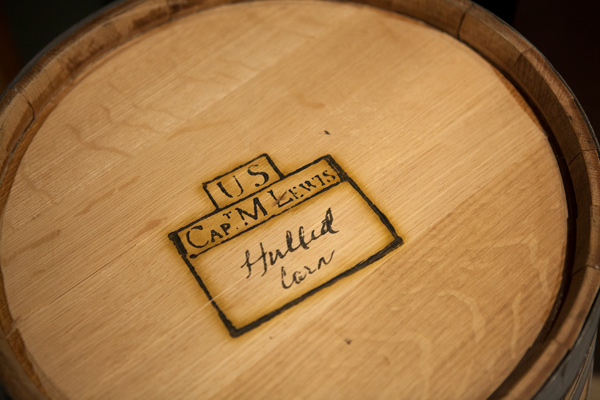The day at winter quarters on the present Wood River in Illinois is spent packing provisions such as corn, flour, and salt. Pvt. Reed is sent to St. Louis to run errands. At Monticello, President Jefferson writes instructions for an expedition to explore the Red and Arkansas rivers.
Keg of Hulled Corn
Taken with cooperation from the Fort Mandan Visitors’ Center. Photo © 2013 by Kristopher K. Townsend. Permission to use granted under the Creative Commons Attribution-Share Alike 4.0 International license.
St. Louis Errands
I sent Reed to St Louis with a letter & Some [Scerlet?] &c. Locks to be mended
—William Clark
Packing Provisions
I had finished off and packed up to day in part of my Store of Provisions—
13 Bags of Parched meal of 2 bus: each
9 do— Common Meal of N C— do
11 do & 3 barrels of N: Corn Huled do
3 do: & 30 —½ do—of Flour— do
7 Barrels of Salt of 2 ½ bushels each— do
—William Clark
Thomas Jefferson’s Instructions to Thomas Freeman
Before the Lewis and Clark Expedition began their journey up the Missouri, Thomas Jefferson had drafted instructions for exploring the Red and Arkansas Rivers. Thomas Freeman would later be selected to lead the expedition, and he was presented a signed copy of these instructions in November 1805.
[April 14, 1804]
To
The government of the US. being desirous of informing itself of the extent of the country ceded to them under the name of Louisiana to have the same with it’s principal rivers geographically delineated to learn the character of the soil climate productions and inhabitants you are appointed to explore for these purposes the interesting portion of it which lies on the Arkansa and Red rivers from their confluence with the Missisipi to the remotest source of the main stream of each, and the highlands connecting the same, and forming a part of the boundary of the province.
Given under my hand and seal at Monticello this 14th day of April 1804….
Th: Jefferson[1]Transcribed from Freeman’s personal copy by Daniel L. Flores in Southern Counterpart with Lewis & Clark: The Freeman & Custis Expedition of 1806 (Norman, Oklahoma: University of … Continue reading
Weather Diary
Thermometr. at rise
Weather Wind at Sunrise Thermometr. at 4 oClock Weather Wind at 4 oClock River 30 above 0 fair S W fair fall 5 in. —William Clark[2]To assist the reader, the editor of this web page has omitted the date column, merged the “River” columns, and spelled out some abbreviations.
Experience the Lewis and Clark Trail
The Lewis and Clark Trail Experience—our sister site at lewisandclark.travel—connects the world to people and places on the Lewis and Clark Trail.
Plan a trip related to April 14, 1804:

Winter Camp at Wood River (Camp Dubois) is a High Potential Historic Site along the Lewis and Clark National Historic Trail managed by the U.S. National Park Service. The site, near Hartford, Illinois, is managed as Lewis and Clark State Historic Site and is open to the public.
In present St. Louis, the Jefferson National Expansion Memorial “commemorates Thomas Jefferson’s vision of the continental expansion of the United States” and is a High Potential Historic Site along the Lewis and Clark National Historic Trail managed by the U.S. National Park Service.
Notes
| ↑1 | Transcribed from Freeman’s personal copy by Daniel L. Flores in Southern Counterpart with Lewis & Clark: The Freeman & Custis Expedition of 1806 (Norman, Oklahoma: University of Oklahoma Press, 1984), 319–325. An alternate draft is available at www.loc.gov/item/mtjbib013365/. |
|---|---|
| ↑2 | To assist the reader, the editor of this web page has omitted the date column, merged the “River” columns, and spelled out some abbreviations. |



